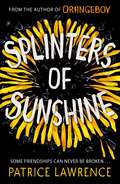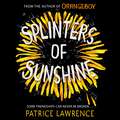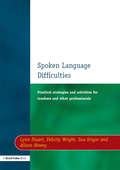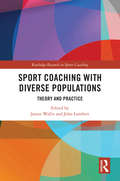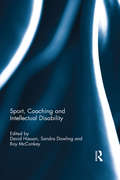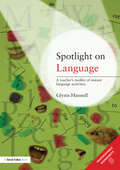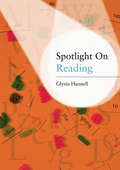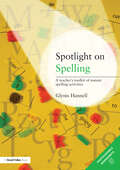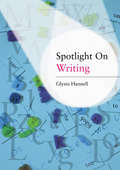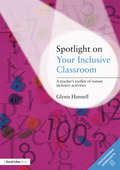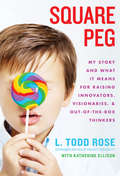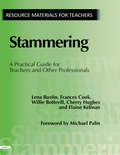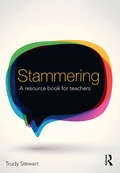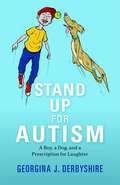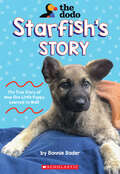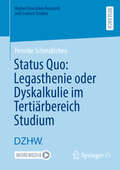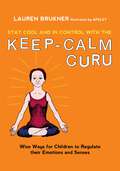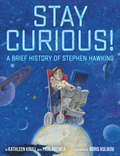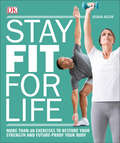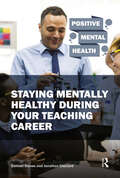- Table View
- List View
Splinters of Sunshine
by Patrice LawrenceFrom the multi-award-winning author of Orangeboy, comes a YA road-trip mystery.I pick up the envelope . . . As I rip down the sides, there's loads of paper bursting out; stuck on flowers, dandelions, roses . . .Spey recently received two surprises. The first: his ex-prisoner dad turning up unannounced, and the second: a mysterious package containing torn-up paper flowers. Spey instantly recognises it as a collage he made with his old friend Dee, and decides she must be in danger, but there are no clues to her whereabouts. There's only one person he knows who can help to track her down . . . On a road trip like no other, will Spey and his dad find Dee, before it's too late?
Splinters of Sunshine (Black Stories Matter)
by Patrice LawrenceFrom the multi-award-winning author of Orangeboy, comes a YA road-trip mystery. After a fun Christmas Eve decorating the tree and singing along with his mum to Queen, fifteen-year-old Spey wakes up on Christmas morning to find the ex-prisoner father he has never met asleep on the sofa.Then he receives a mysterious package in the post: a torn envelope filled with half a collage he made with his old friend Dee on her sixth birthday. Dee bounced between schools and pupil referral units until a tragedy meant she ended up in care outside of London, drawn into the world of county lines gangs. They haven't spoken for years, but Spey is sure she must be in danger. He just doesn't know where she is.There's only one person Spey can think of who might be able to help ... On a roadtrip like no other, can Spey and his dad find Dee, and will they be ready to confront a criminal gang together? (P) 2021 Hodder & Stoughton Limited
Spoken Language Difficulties: Practical Strategies and Activities for Teachers and Other Professionals
by Lynn Stuart Felicity Wright Sue Grigor Alison HoweyIntended as a practical approach to helping children who have spoken language difficulties because of general language delay or specific language impairment, this book contains ideas and activity sheets as well as structured guidance. Areas of language difficulty are identified, activities are suggested to meet these language needs and all this is supported by a developmental framework. This book also provides advice on classroom management and grouping, in addition to a bank of individual targets for IEPs which are linked to the activities and strategies suggested within the book. Suitable for non-specialists and specialists alike, many professionals find this book to be an invaluable resource, including mainstream teachers, teaching assistants, speech and language therapists working in schools, SENCOs, nursery nurses and special school teachers.
Sport Coaching with Diverse Populations: Theory and Practice (Routledge Research in Sports Coaching)
by James Wallis and John LambertSports coaches apply their skills in a wider variety of contexts, and with a more diverse range of athletes and participants, than ever before. This book introduces the professional competencies and knowledge needed to build successful working relationships across the different communities and groups with which coaches operate. The book offers important insight for coaches who work with specific populations including different age groups; black, Asian and minority ethnic (BAME) people; those of different gender or sexual orientation; individuals with disabilities or illness; the socio-economically disadvantaged; and refugees. Drawing on real-world case studies, such as coaching girls in combat sports and coaching cardiac rehab patients, and adopting a critical approach to values, philosophy and pedagogic process, this book argues that understanding the recipient of coaching and their particular needs is as important as content knowledge. With contributions from leading coaching researchers and practitioners, this is important reading for developing coaches, students on sports courses and other individuals involved in the sport pedagogy domain who seek to gain a better understanding of the demands of meeting the specific needs of people in the coaching process.
Sport, Coaching and Intellectual Disability
by David Hassan Sandra Dowling Roy McConkeyThere are more opportunities than ever before for young people with disabilities to participate in sport and adapted physical education. For example, there are more than 3.7 million athletes worldwide aligned to the Special Olympics organisation, with national associations active in more than 200 countries worldwide. Despite this rapid growth, all too often coaches and teachers lack adequate knowledge of the particular challenges faced by people with intellectual disabilities. The principal aim of this book is to improve the understanding and professional skills of coaches, teachers, practitioners and researchers, to promote awareness of successful programmes addressing the needs of such young people, and to challenge the prevailing myths and stereotypes surrounding their abilities. With contributions from leading researchers and practitioners around the world, this book is the first to explore in depth the topic of sport and intellectual disability from a coaching perspective. Including both theoretical discussion and empirical case-studies, the book covers a full range of contemporary issues and themes, including training and coaching, family support, perceptions of disability, athlete motivation, positive sport experiences, motor development programmes, and social and cultural aspects of disability. Sport Coaching and Intellectual Disability is important reading for any student, researcher, coach, teacher, manager or policy maker with an interest in disability sport, physical education, coaching, or mainstream disability studies.
Spotlight on Language: A Teacher's Toolkit of Instant Language Activities
by Glynis HannellSpotlight on Language offers teachers a wide variety of topics and activities to stimulate, engage, challenge, entertain and extend all pupils’ language skills. This extremely practical resource provides busy teachers and teaching assistants with a collection of worksheets that can be used as instant, educationally appropriate learning activities written specifically with the inclusive classroom in mind. All the books in this series: Promote effective intervention and inclusion strategies for teachers and teaching assistants Provide materials that are solidly grounded in an understanding of how children learn and the particular difficulties of children with special needs. Stimulate discussion and interaction Can be used as part of an individual or small group learning programme for a child with special needs Provide 'whole class' materials that can also engage older children or those with a higher level of achievement Offer teachers quick, fun activities that never require additional resources, special materials or preparation. Spotlight on Language is an essential tool for any teacher striving to offer every pupil opportunities to maximise their own potential and develop strong language skills.
Spotlight on Reading: A Teacher's Toolkit of Instant Reading Activities
by Glynis HannellSpotlight on Reading offers teachers a wide variety of topics and activities to stimulate, engage, challenge, entertain and extend all pupils’ reading skills. This extremely practical resource provides busy teachers and teaching assistants with a collection of worksheets that can be used as instant, educationally appropriate learning activities written specifically with the inclusive classroom in mind. The wide variety of exercises will enable pupils to understand and work on phonics and to improve their reading comprehension rehearsed reading. All the books in this series: Promote effective intervention and inclusion strategies for teachers and teaching assistants Provide materials that are solidly grounded in an understanding of how children learn and the particular difficulties of children with special needs. Stimulate discussion and interaction Can be used as part of an individual or small group learning programme for a child with special needs Provide 'whole class' materials that can also engage older children or those with a higher level of achievement Offer teachers quick, fun activities that never require additional resources, special materials or preparation. Spotlight on Reading is an essential tool for any teacher striving to offer every pupil opportunities to maximise their own potential and develop strong reading skills
Spotlight on Spelling: A Teacher's Toolkit of Instant Spelling Activities
by Glynis HannellSpotlight on Spelling offers teachers a wide variety of topics and activities to stimulate, engage, challenge, entertain and extend all pupils’ spelling skills. This extremely practical resource provides busy teachers and teaching assistants with a collection of worksheets that can be used as instant, educationally appropriate learning activities written specifically with the inclusive classroom in mind. The wide variety of exercises will enable pupils to work on letters, sounds and tough words and help them to improve their phonological awareness. All the books in this series: Promote effective intervention and inclusion strategies for teachers and teaching assistants Provide materials that are solidly grounded in an understanding of how children learn and the particular difficulties of children with special needs. Stimulate discussion and interaction Can be used as part of an individual or small group learning programme for a child with special needs Provide 'whole class' materials that can also engage older children or those with a higher level of achievement Offer teachers quick, fun activities that never require additional resources, special materials or preparation. Spotlight on Spelling is an essential tool for any teacher striving to offer every pupil opportunities to maximise their own potential and develop strong spelling skills.
Spotlight on Writing: A Teacher's Toolkit of Instant Writing Activities
by Glynis HannellSpotlight on Writing offers teachers a wide variety of topics and activities to stimulate, engage, challenge, entertain and extend all pupils’ writing skills. This extremely practical resource provides busy teachers and teaching assistants with a collection of worksheets that can be used as instant, educationally appropriate learning activities written specifically with the inclusive classroom in mind. The wide variety of exercises encourages pupils to think about writing and to develop skills in writing facts and information, creative writing and editing, whilst building confidence and motivation. Teachers can use this book to develop a flexible inclusive approach, comprising individualised materials and opportunities for extended practice. All the books in this series: Promote effective intervention and inclusion strategies for teachers and teaching assistants Provide materials that are solidly grounded in an understanding of how children learn and the particular difficulties of children with special needs. Stimulate discussion and interaction Can be used as part of an individual or small group learning programme for a child with special needs Provide 'whole class' materials that can also engage older children or those with a higher level of achievement Offer teachers quick, fun activities that never require additional resources, special materials or preparation. Spotlight on Writing is an essential tool for any teacher striving to offer every pupil opportunities to maximise their own potential and develop strong writing skills.
Spotlight on Your Inclusive Classroom: A Teacher's Toolkit of Instant Inclusive Activities
by Glynis HannellSpotlight on Your Inclusive Classroom offers teachers an interesting miscellany of topics and activities to stimulate, engage, challenge, entertain and extend all pupils’ thinking skills and knowledge base. This extremely practical resource provides busy teachers and teaching assistants with a collection of worksheets that can be used as instant, educationally appropriate learning activities written specifically with the inclusive classroom in mind. All the books in this series: promote effective intervention and inclusion strategies for teachers and teaching assistants provide materials that are solidly grounded in an understanding of how children learn and the particular difficulties of children with special needs. stimulate discussion and interaction can be used as part of an individual or small group learning programme for a child with special needs provide 'whole class' materials that can also engage older children or those with a higher level of achievement offer teachers quick, fun activities that never require additional resources, special materials or preparation. Spotlight on Your Inclusive Classroom is an essential tool for any teacher striving to offer every pupil opportunities to maximise their own potential.
Square Peg: My Story and What It Means for Raising Innovators, Visionaries, and Out-of-the-Box Thinkers
by Todd RoseIn the seventh grade, Todd Rose was suspended-not for the first time-for throwing six stink bombs at the blackboard, where his art teacher stood with his back to the class. At eighteen, he was a high school dropout, stocking shelves at a department store for $4.25 an hour. Today, Rose is a faculty member at the Harvard Graduate School of Education.Square Peg illuminates the struggles of millions of bright young children--and their frustrated parents and teachers--who are stuck in a one-size-fits-all school system that fails to approach the student as an individual. Rose shares his own incredible journey from troubled childhood to Harvard, seamlessly integrating cutting-edge research in neuroscience and psychology along with advances in the field of education, to ultimately provide a roadmap for parents and teachers of kids who are the casualties of America's antiquated school system.With a distinguished blend of humor, humility, and practical advice for nurturing children who are a poor fit in conventional schools, Square Peg is a game-changing manifesto that provides groundbreaking insight into how we can get the most out of all the students in our classrooms, and why today's dropouts could be tomorrow's innovators.
Stammering: A Practical Guide for Teachers and Other Professionals (Jkp Essentials Ser.)
by Elaine Kelman lena Rustin Frances Cook Willie Botterill Cherry HughesThis book provides essential information and guidance about stammering for those working in educational settings. The highly experienced team of authors demonstrates how early intervention is essential if children who stammer are to have the best chance of recovery; the practical strategies that can help with children's oral participation in class, particulary in the light of recent innovations such as the literacy hour and national numeracy strategy; the ways in which teachers can address the educational and social implications of stammering, and reverse the risk of underachieving if these children become isolated, anxious, withdrawn or disruptive; how to influence the climate in schools so that children who stammer are better understood and can be helped to their full potential; and how to prepare pupils for exams, particularly in secondary schools where they may be taking oral examinations. Throughout the text, reference is made to new government initiatives where appropriate, and each chapter includes case studies, practical tasks and activities that can be used in the school setting.
Stammering: A resource book for teachers (Overcoming Common Problems Ser.)
by Trudy StewartWhat is stammering? How does it present itself? When does it occur? Why does it happen? What are the most effective strategies you can use to help? Providing background information about stammering as well as a wide range of tools and strategies, this practical book addresses the key challenges faced at nursery and school. There are separate sections on early years, primary and secondary level and include the most common areas that teachers must consider when supporting children who lack speech fluency, including: identifying children at risk of developing a stammer how to manage incidents of stammering how to manage classroom communication and oral participation helping children to make and maintain relationships help children to manage feelings associated with stammering working alongside speech and language therapists. Recent changes to the curriculum means that there is now a greater demand on children’s communication skills than ever. This book will help you provide the necessary support to a child who stammers by offering a clear explanation of the presentation of stammering and the best ways you manage the occurrence of stammering in a range of school contexts. Full of tips and advice this book will enable teachers and other professionals to work effectively with a child who stammers. This accessible book is essential for anyone concerned about a child in their care who presents with a stammer, including teachers, student teachers, SENCOs and parents.
Stand Up for Autism
by Georgina J. DerbyshireWhen we tell someone that our child is autistic, the most common response is a sad face and an apologetic look. I hate it when people say "I'm sorry to hear that". Parenting a child on the autistic spectrum can be tough at the best of times, but few books take the time to celebrate the love and laughter an autistic child can elicit in their parents and those around them. In this warm, honest and laugh-out-loud tale of bringing up Bobby, now ten, Georgina Derbyshire shares and rejoices in his 'slightly different' childhood. As she outlines momentous events in Bobby's life, from the day he decided he was a dog (continuing life as a canine for a year afterwards), to the time he catapulted an innocent shopper into a mountain of strawberries, Georgina repeatedly challenges the perception of autism as an affliction, maintaining that neurotypical people often make far less sense. Through her light-hearted and hilarious storytelling, she reveals how social codes and psychological games make the neurotypical world a very confusing place to live in, more so than ever if you happen to be a young boy with a passion for rocks, tape measures and trains. This book is a must for anybody involved in the upbringing of an autistic child, whether they are in search of a little comfort, companionship, light relief - or all three.
Standing on One Foot
by Kenneth JerniganThis is book six of the Kernel Series. The ways of overcoming challenges that face individuals who want a normal life in spite of blindness is revealed in these short true-to-life stories.
Star of Light
by Patricia St. JohnHamid's blind sister, Kinza is about to be sold to a beggar by their stepfather. Hamid must rescue Kinza and escape from their mountain village to safety.
Starfish's Story (The Dodo)
by Bonnie BaderThe true story of how one little puppy learned to walk -- as seen on The Dodo!When Starfish was rescued from a California beach, this Belgian Malinois puppy couldn't stand. That's because Starfish had swimmer puppy syndrome, which meant her leg muscles hadn't developed properly. If Starfish was going to walk, she would need help from a lot of new friends.Luckily, a team of doctors, therapists, and Starfish's family all worked together to encourage and support her. This true story teaches us what it means to never give up hope. With some love, hard work, and a "can-do" attitude, Starfish reached her goals and inspired everyone around her.This story is perfect for middle-grade readers and comes with eight pages of full-color photos!
Stateless
by Elizabeth WeinIn this historical thriller from the bestselling author of Code Name Verity, Stella North enters an air race competition as the only woman—and finds herself thrown into a mystery she must solve before it kills her. When Stella North is chosen to represent Britain in Europe&’s first air race for young people, she knows all too well how high the stakes are. As the only participating female pilot, it&’ll be a constant challenge to prove she&’s a worthy competitor. But promoting peace in Europe, the goal of the race, feels empty to Stella when civil war is raging in Spain and the Nazis are gaining power—and when, right from the start, someone resorts to cutthroat sabotage to get ahead of the competition. The world is looking for inspiration in what&’s meant to be a friendly sporting event. But each of the racers is hiding a turbulent and violent past, and any one of them might be capable of murder—including Stella herself. Agatha Christie meets Karen McManus in this thrilling mystery, packed with adventure, intrigue, love, and betrayal, from bestselling and award-winning author Elizabeth Wein.
Status Quo: Legasthenie oder Dyskalkulie im Tertiärbereich Studium (Higher Education Research and Science Studies)
by Henrike SchmidtchenMenschen mit Legasthenie und Dyskalkulie sind an deutschen Hochschulen stark unterrepräsentiert und die Forschung zu diesem Thema ist rar. Eine gleichberechtigte und diskriminierungsfreie Teilhabe von Studierenden mit studienerschwerenden Beeinträchtigungen gemäß der UN-Behindertenrechtskonventionen kann durch die Hochschulen allerdings nur sichergestellt werden, wenn wissenschaftlich fundierte Ergebnisse in den Prozess bis hin zur 2009 von der Hochschulrektorenkonferenz geforderten „Hochschule für alle“ einfließen. In diesem Buch wird untersucht, wie sich der Tertiärbereich Studium in der Bildungskarriere von Personen mit den Teilleistungsstörungen Legasthenie oder Dyskalkulie gestaltet und gibt damit erstmals einen Überblick über den Status Quo dieser Studierendengruppe. Die inhaltlich-strukturierende qualitative Inhaltsanalyse zeigt, dass Studierende mit Legasthenie und Dyskalkulie bereits hilfreiche individuelle Ressourcen beispielsweise in Form von Lern- und Copingstrategien nutzen und auch den an Hochschulen gesetzlich-verankerten Nachteilsausgleich teils als unterstützend empfinden. Dennoch sind die befragten Studierenden - nicht zuletzt durch die Covid-19-Pandemie – auf diversen Ebenen mit verschiedensten Herausforderungen konfrontiert, die zu psychischer Belastung und Studienerschwernissen führen können.
Stay Cool and In Control with the Keep-Calm Guru: Wise Ways for Children to Regulate their Emotions and Senses
by Apsley Lauren BruknerMeet the Keep-Calm Guru, our expert guide to the art of staying cool, calm, and in control in the face of overpowering feelings! This illustrated book introduces wise ways for children to recognize and cope with anxiety, anger, frustration, and other difficult emotions. Using everything from yoga poses and pressure holds, to deep breathing and relaxing coloring activities, the Keep-Calm Guru shows kids how to take back control and feel cool, calm, and just right. Suitable for children with sensory and emotional regulation difficulties aged approximately 7-14 years.
Stay Curious!: A Brief History of Stephen Hawking
by Kathleen Krull Paul BrewerA picture-book biography about science superstar Stephen Hawking, whose visionary mind revolutionized our concept of reality and whose struggle with ALS inspired millions. Perfect for parents and teachers looking to instill curiosity and a love for STEM.As a young boy, Stephen Hawking loved to read, stargaze, and figure out how things worked. He looked at the world and always asked, Why?He never lost that curiosity, which led him to make groundbreaking discoveries about the universe as a young man. Even being diagnosed with ALS didn't slow Stephen down. Those questions kept coming. As his body weakened, Stephen's mind expanded--allowing him to unlock secrets of the universe and become one of the most famous scientists of all time.Stephen always approached life with courage, a sense of humor, and endless curiosity. His story will encourage readers to look at the world around them with new eyes.
Stay Fit for Life: More than 60 Exercises to Restore Your Strength and Future-Proof Your Body
by Joshua KozakFuture-proof your body and restore strength and mobility to everyday movements--all from home. You won't believe how much these simple exercises will transform your life and give you confidence. All you need is your body, and maybe a chair and some very light weights. They say 50 is the new 40, and you can make that a reality with streamlined functional training that is designed specifically for seniors and baby boomers! Stay Fit for Life empowers you to move with more ease and efficiency when performing functional movements.Bending, twisting, pushing, pulling, and reaching--exercies targeting these movements make everyday activities such as running, gardening, or playing with grandchildren both easier and more enjoyable. Unlike traditional resistance training that targets isolated muscle groups, the compound movement exercises in Stay Fit for Life engage multiple muscle groups simultaneously, helping people of all fitness levels lead more active, dynamic lives.Here's what you'll find in Stay Fit for Life: - Over 60 step-by-step exercises to increase strength, improve mobility, and enhance flexibility, all demonstrated with bright, clear photography - Modifications for every exercise to make it easier or more challenging, including chair and low-impact variations - Three four-week fitness programs designed to match every fitness level - Twenty prescriptive workout routines designed to target specific needs such as lower back strength, posture improvement, aerobic fitness, balance and stability, and more
Staying Mentally Healthy During Your Teaching Career (Positive Mental Health)
by Jonathan Glazzard Samuel StonesThe mental health of teachers in school is just as important as the well-being of the pupils they support. Recent research reveals some alarming statistics, including that 74% of teachers are unable to relax and have a poor work-life balance. This book examines a range of relevant issues including workload, managing behaviour, developing resilience and managing professional relationships in order to address some of these concerns and provide comprehensive guidance and workable, evidence-informed strategies to support all those teaching in schools and colleges.
Stem Cell Revolution: Discover 26 Disruptive Technological Advances to Stem Cell Activation
by Joseph ChristianoAddressing chronic back pain, diabetes, joint replacements, osteoarthritis, neurological issues, and more, Joseph &“Dr. Joe&” Christiano reveals how this cutting-edge therapy can rapidly replace damaged cells in the body with no side effects or allergic reactions. If you have been disappointed by ineffective treatments, the answer to improving your health may be in your stem cells. Dr. Joe explains how adult stem cell therapy and activators are two of the new technologies in regenerative medicine that will be game changers in medical history. Adult stem cell therapy is disrupting and revolutionizing the way we think about our health. Stem Cell Revolution features testimonials of people who have seen their pain disappear, COPD reversed, and kidney function restored, among other benefits.
